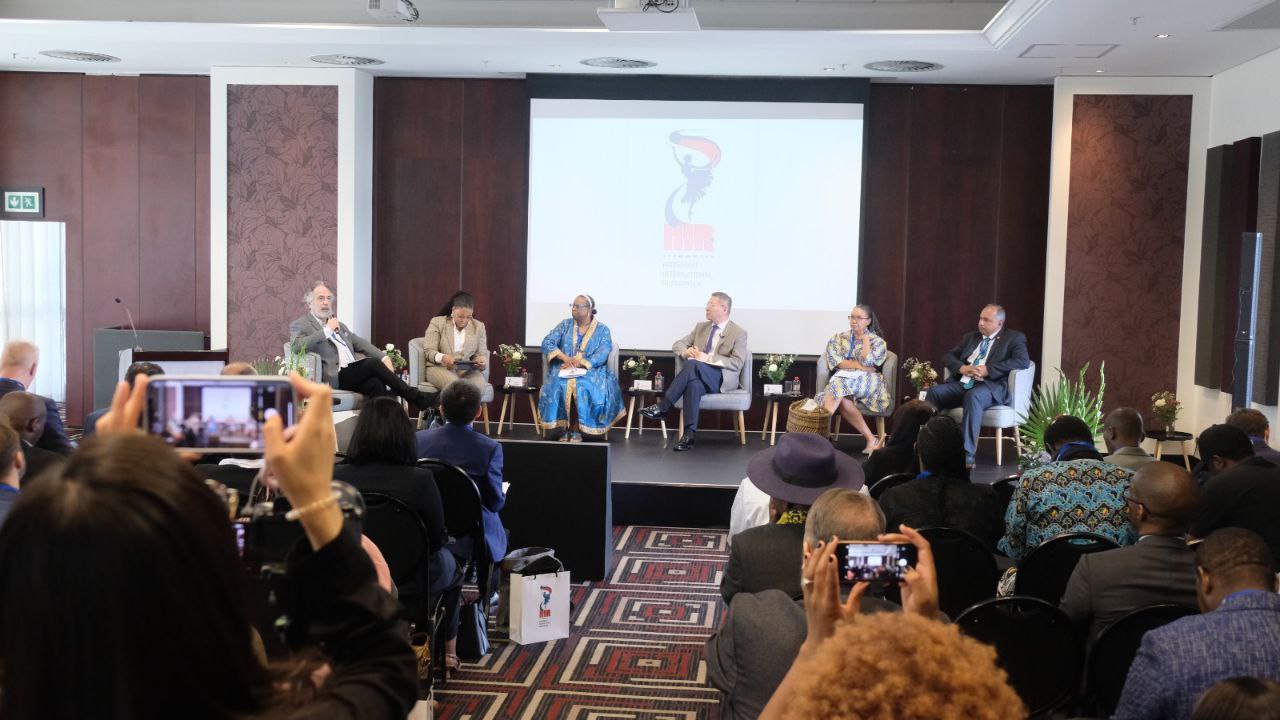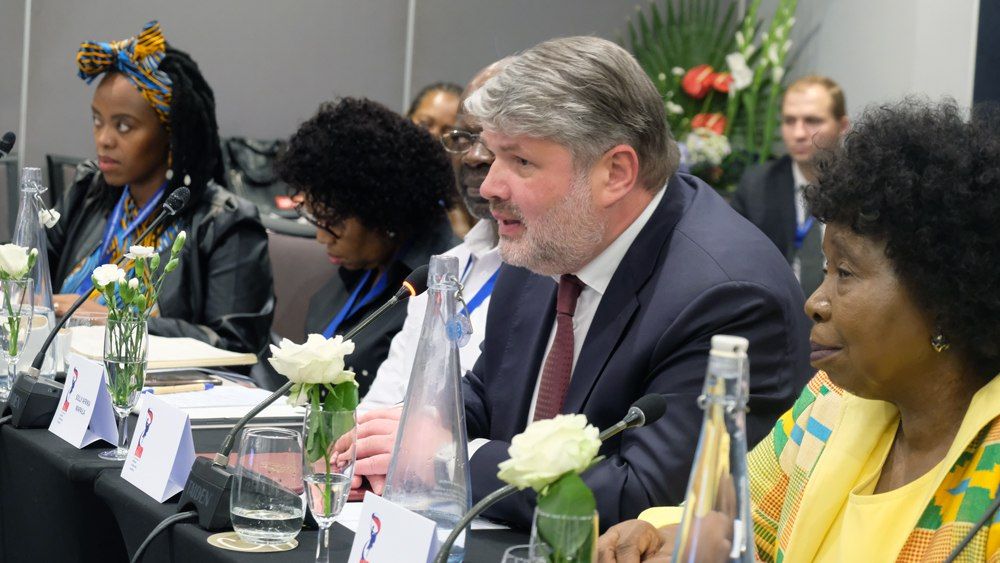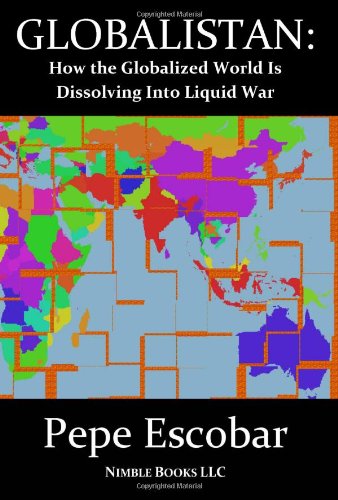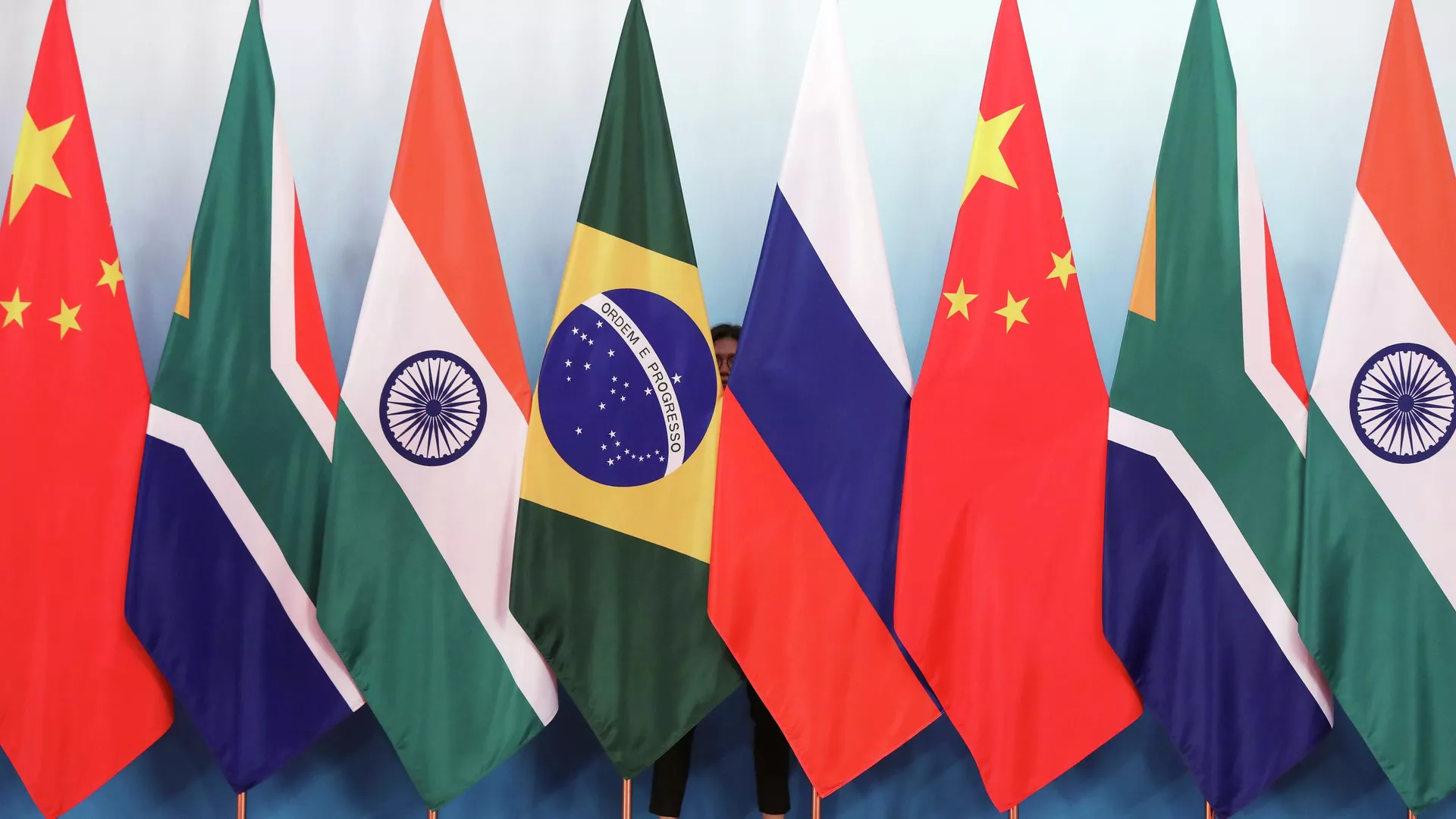
Africa now essentially needs political will to fight infrastructural problems, a human capital deficit and an institutional deficit.
JOHANNESBURG – At the APEC annual summit in Lima, Comrade Xi Jinping was practically coronated as the King of Peru, as a lively moveable feast celebrated the brand new $1.3 billion Chancay-Shanghai Maritime Silk Road across the Pacific.
There could hardly be a more auspicious counterpart to the action in South America than to gather in BRICS member South Africa to discuss African Unity in a Multipolar World, as well as the perennial plagues of racism, fascism, Russophobia and other forms of discrimination. The meetings were coordinated by the Mouvement Russophile International (MIR), who is not only Russophile but most of all, multi-nodal-phile (italics mine).
It’s as if this was an extension of the memorable BRICS 2024 summit in Kazan.
In Kazan, BRICS de facto expanded out of 9 members, adding 13 member-partners and reaching 22 nations (Saudi Arabia, an immensely complex case, remains on the fence). BRICS+ now largely surpasses the – waning – influence of the G20, whose annual summit is ongoing in Rio, at least focused on social issues and the fight against poverty and hunger, and not war. Still, the crisis-riddled G7/NATOstan did try to hijack the agenda.
For all practical purposes, and borrowing from one of Xi’s metaphors, BRICS+ has already set sail exploring the lineaments of a new, just, fair world order.
In Johannesburg, the sterling analytical quality of South African interlocutors, plus contributions from Mali and Senegal, was a source of pure joy.
The tone was realist, critical, hopeful – ranging from Nomvula Mokonyane, chairperson of the African National Congress (ANC) international relations committee, and a firm supporter of Palestine/Gaza, Cuba and Western Sahara, to former Minister of Foreign Affairs Dr. Nkosazana Dlamini-Zuma; from Sikelela Mgalagala, an entrepreneur and graduate of the Belarusian State Agrarian University, to extremely accomplished media entrepreneur and receiver of a special prize at a BRICS forum in Sochi, Nonkululeko Mantula; from Senegalese Souleyman Ndiaye, deputy secretary-general of the International Russophile Movement, to Mali’s Amadou Gambi; from crack geopolitical analyst Joe Mshalla to former diplomat Botsang Moiloa, a heir to the royal aristocracy of Botswana and Lesotho and a man of unbounded energy.
Unequal Africa in numbers is always a staggering proposition – inviting deep reflection. What could be defined as The Big Five – Algeria, Egypt, Nigeria, Ethiopia and South Africa – are responsible for no less than half of Africa’s GDP.
Three of these are now full BRICS members, and the other two are BRICS partners.
Pretoria-based legal expert Dr. Andre Thomashausen provided extra startling figures.
Africa, with 20% of the earth’s landmass – in which China, India, U.S. and Europe could easily “fit” – and 30% of the globe’s natural resources (including critical minerals such as lithium), not to mention 17% of the world’s population (1.3 billion people), accounts for only 2.8% of the world’s GDP.
The conclusion is inevitable: the IMF and the World Bank ultimately failed Africa. In 2025, Africa will be home to no less than 8% of the world’s poor.
A new pan-Africa development model, away from the Bretton Woods system, is beyond imperative. And Russia has all it takes to play a leading role.
No African nation implemented or enforced western sanctions on Russia. As Thomashausen recalled, at the 2023 St. Petersburg Economic Forum President Putin offered to donate grain to African nations, and later did not condemn military coups in West Africa, unlike the African Union – totally understanding the anti-colonization drive.
Russia is strategically replacing France in West Africa and strongly supports the Alliance of Sahel States (Mali, Niger, Burkina Faso).
Thomashausen noted that even as Russia’s involvement in Africa lags compared to other powers, Moscow managed to accumulate considerable soft power with only 5% of Chinese investments, creating political leverage with deals in agro-industries, security, nuclear energy and mining: ‘It has all but eliminated French influence. Its security service offerings have trumped U.S. and EU.”
Shaping a “new blueprint”
One of the key themes of the discussions in Johannesburg was Africa’s civilizational rule.
The inestimable Prof. Zhang Weiwei from Fudan University’s China Institute reaffirmed the “four evils” fought by China: racism, Islamophobia, Russophobia and Sinophobia. When it comes to shaping an “African civilizational community”, he suggested lessons to be learned by transposing the ASEAN model: the Southeast Asian consensual way.
As Prof. Zhang formulated, “while rules rule Europe, win-win rules Asia.” The key point when shaping a “cultural civilization structure” is “strategic patience: two steps forward, one step back.”
In Asia, China supports ASEAN centrality. Compare it with NATO, which bases itself on Divide and Rule: “The lesson for Africa is to invest in institutionalized cooperation. This could be an inspiration for Africa.”
Amadou Gambi from Mali extolled the great Mali empire of the 13th century in parallel now to “brave young soldiers bringing Mali to itself” within the Association of Sahel States.
Another key point of all discussions: as those who control the narrative control the future – and also the past – the great challenge for Africa is “The Decolonization of the Mind”, as stressed by several South African scholars.
Roman Ambarov, plenipotentiary ambassador of Russia in BRICS partner South Africa, chaired a U-table on ‘African Unity in a Multipolar World’. Significantly, right off the bat he quoted Putin quoting Nelson Mandela – “how many times I stood up after I fell”.
That led Dr. Nkosazana to address the most tortuous challenge: how to conform politically united Africa. It helps, she said, that “our most precious resource is people” and they are “young, educated, with skills.”
Dawie Roodt, chief economist of the Efficient Group, summarized the geoeconomic challenge: the need for a currency for all of Africa, “with a big capital market behind”. That would be linked to increased connectivity, the building of new cities and industries, and a renewed leadership.
Prof. Zhang Weiwei once again focused on the China model as “unite and prosper”, focusing on “people’s livelihood first”, with tangible results. He qualified Putin as “a true revolutionary”, in contrast with China since Deng Xiaoping as “reformist” – and recalled when China had a lower per capita income than Malawi.
China then carried out “essential revolutions”, as the social index went up; that was the foundation for subsequent development. As for the model, it’s “selection, not elections”: the Communist Party of China (CPC) is “holistic”. Deng said “yes” to economic globalization – but selectively; and “no” to political globalization.
A key theme for most speakers is that building Africa unity leads to African agency: from geopolitical recipient to geopolitical actor, with non-alignment intimately linked to the pursuit of autonomy. Out of 55 nations – 27% of the UN – no less than 28 African nations were colonized by France. Finally real post-French de-colonization is on the move.
Mali’s Amadou Gambi focused on the exhilarating history of African unity, addressed step by step. That will eventually transform into competitive advantages, and Africa’s capacity to negotiate as a collective. As Sikelela Mgalagala stressed, the “new blueprint” should be created by Africa, using, for instance, BRI to get advantages and BRICS as a major tool.
A consensus emerged among all African participants that Africa now essentially needs political will to fight infrastructural problems, a human capital deficit and an institutional deficit. So institutions must be fixed – in parallel to the process of fighting against cultural (re)colonization.
It was up to the redoubtable Cynthia McKinney – backed by her six terms at the U.S. Congress – to introduce a note of deep realism. Africa may now be on the road to affirm itself. But no one should be fooled: what happened to Gadaffi was just a sample of how far the usual suspects are willing to go to prevent African agency. The new political leadership must be fully aware that the deeper they go, “they run the risk of being killed”.

 RSS
RSS












zato will never be able to do what they did to gadaffi ever again. that was the turning point at which the russians and chinese decided they would no longer allow “rules based order” zioneocons to have their way with the world. ukraine and taiwan are evidence of this and this is why africa welcomes them with open arms.
this is also why the u.s. and france are being thrown out in such a humiliating fashion and wagner is becoming a military force in africa, as russia and china become the major economic forces, that give the africans an option, other than zioneocon exploitation. this is brics in action.
We need power and industry, like the West used to have, like what the Chinese and others now have. It’s been done here before, but not on a large enough scale. All the resources are available here, but they are selling us deindustrialization before we even get a chance. Sure it will be dirty, but then so was the process in the West and other places. You can’t expect people to jump from feudalism to the space age with no learning curve.
Proof that not everyone in the world only thinks about killing and stealing and shows the difference with the racist white world.
Having witnessed up close what blacks did to Detroit, and seeing what destruction blacks have wrought to every major American city, and having visited many African countries on all its coasts professionally, I can state, without a doubt, that nothing good will ever come from inclusion of African countries in the BRICs+ coalition. There is no exception for any exchange with black people from reverting to the African mean. Profits will be lost, people will be killed. And that’s that!
Yeah, Africa is a disaster. The only reason Russia and China want things to come right in Africa is because, up till now, Africa was just subsidizing the activities and the wealth of the West. And if Africa didn’t play ball then a coup would happen to get someone who would play ball in charge. So Russia and China are hoping that Africa comes right and stops just sending all their wealth to the West.
But Africa will never come right, they will always be someone’s colony. Proof of this is South Africa. There you had a flourishing country with all the infrastructure in place, and what happened, the black ANC government just went and neglected to maintain all that infrastructure so now the big cities like Durban are finished, Johannesburg is nearly finished. Soon South Africa will be at the IMF with begging bowl in hand. African countries destroy themselves because they don’t have the brains to build or maintain anything, yet they always blame others.
And people in the West think that Africa will come right if they just had the education, if they just made some cultural changes. Meanwhile the problem is in the dna. As they say in Africa, a leopard can’t change its spots, and that is because the spots are in the genetics, in the dna. So with a continent with such low IQ that 30% is considered a pass in matric / form / grade 12 in South Africa, it stands to reason that water will only work 30% of the time, electricity working 30% of the time, law and order working only 30% of the time, traffic lights only working 30% of the time, etc, etc. Take a look at Soweto, the biggest black township in Johannesburg, of Mandela fame. There 80 to 85% of the people don’t pay for electricity, water, sewage or rates. How can any country function under such situations? And it is not that they can’t afford to pay, its because the government will just declare another payment amnesty yet again wiping out all their debts, because those people vote for the government. Why pay when all your debt will just get forgiven every X years since 1994 when Apartheid collapsed? But soon all the free money is going to run out.
So yes, the problem in Africa is in the dna.
Engaging in respectful dialogue and fostering mutual understanding can help challenge preconceived notions and encourage more nuanced views. If you’d like to explore more about the history, context, or data around these topics, I’d be happy to help! Pamoja.
You can complain about Africa, but in the end the problem needs to be fixed at its source, or else they will bring the problem to other places. That’s why I support BRICS even if there are reasons to doubt.
Like they say, it’s a dirty job but someone’s got to do it. People have no idea how hard white racists work to keep struggling systems going all around the world, because what else is a man to do?
As an ex South African watching the blooming BRICS romance with the idea of an African Renaissance (especially mother Russia), all I can say is good luck with that, of course they will succeed where everyone else has failed.
The narrative of Africa finally wrestling itself free from all that “evil colonialism” with the help of BRICS etc., what a joke to those who have actually lived through the process.
What in reality is happening now is that 1st world countries are being pulled down to 3rd world standards, not 3rd world countries being pulled up to 1st world status.
There have always been 1st world enclaves within these 3rd world countries, they are shrinking, not growing.
Yup Ghadaffi was the last straw. That said APEC seemed more prominent than the G20 in the past week. The last BRICS also was definitely more prominent than the G20,
They are emotionally invested in it. Because it stokes their ego to see others fail.
African countries still buy things like grains and even chemicals. They still buy cars and phones and even clothes. They still want solar panels. They also buy military equipment. And they still have lots of raw resources to sell. Russians and Chinese don’t have the “white man’s burden” so aren’t interested in trying to make Africans be like them.
You write:
If Africa has 17% of the Worlds population and 8% of the worlds poor, Africa is doing extremely well,
Less than half of the average rate.
Just as in the US, where the government has thrown countless billions into projects with the hope of reducing the “gap” between blacks and whites, you can throw countless trillions into projects with the hope of developing Africa and the result would be one and the same: even after all that effort, Africa would still be mired in its age-old problems of “underdevelopment”. Depressing, I know. I’m rooting for the Africans, but let’s be real: decades upon decades of development projects have left little evidence of any lasting results.
None of the Chinese projects have produced profound changes in the African struggle for development: no matter how many ports, roads and presidential palaces the Chinese build, these physical structures do not translate into permanent structural economic changes. The same could be said of all the UN aid agencies and the hundreds of NGOs after spending all those years in sub-Saharan Africa: all they do is throw money at the Black Continent and the Black Continent swallows it all up in its big black bottomless pit — mostly to no avail.
What is to be done? Has anyone come up with another type of “solution” besides just more of the same old, same old? Sure, some think that there is nothing that CAN be done, since the average sub-Saharan IQ of 70 has supposedly sealed Africa’s destiny: it is forever fated to shitholedom. After all, what can you expect from a population that, to all intents and purposes, has severe mental deficiencies? Depressing, I know.
The only out-of-the-box proposal I have seen — and one of the only ones that has a snowball’s chance in hell to work — is also the most politically incorrect, racist, third-rail idea you could ever fathom: RE-colonize Africa. Yep. Crazy, I know. Our Jew overlords would make us pay dearly for even considering such a preposterous proposal. But after reading parts of the following book, I’m beginning to think maybe recolonizing Africa could be a solution, a proposal which could be debated in the next BRICS conferences (some quotes after the more tab):
The Case for Colonialism
Bruce Gilley
Excerpts:
There are three ways to reclaim colonialism. One is for governments and peoples in developing countries to replicate as far as possible the colonial governance of their pasts—as successful countries like Singapore, Belize, and Botswana did. The “good governance” agenda, which contains too many assumptions about the self-governing capacity of poor countries, should be replaced with the “colonial governance” agenda.
A second way is to recolonize some regions. Western countries should be encouraged to hold power in specific governance areas (public finances, say, or criminal justice) in order to jump-start enduring reforms in weak states. Rather than speak in euphemisms about “shared sovereignty” or “neo-trusteeship,” such actions should be called “colonialism” because it would embrace rather than evade the historical record. Thirdly, in some instances it may be possible to build new Western colonies from scratch. …
The second broad way to reclaim colonialism is to recolonize some regions. It may be that in some cases, only a formal share of sovereignty for Western countries can provide the mix of accountability and authority needed to build capacity in weak states. In Chesterman’s oft-quoted phrase, the problem with modern state-building is not that it “is colonial in character; rather the problem is that sometimes it is not colonial enough.” …
In 2009, the economist Paul Romer—who became the World Bank’s chief economist in 2016—suggested that rich nations build “charter cities” in poor countries.78 Under this model, largely empty land is leased to a foreign nation or group of nations so that their sovereignty allows a modern enclave to grow up, as was the case in Hong Kong. That tiny British colony, according to Romer, “did more to reduce world poverty than all the aid programs that we’ve undertaken in the last century.”
Don’t be smug, have you ever set foot in or done anything for Africa other than pontificate online? Come get those soft hands dirty and do some work here, I dare you.
Average IQ in Africa is in the 75-90 range. Until Europeans arrived, Africans did not have the wheel, a written language, or the ability to build more than 1-storey buildings. But, hope for a new, “improved” Africa springs eternal according to Pepe. Good luck with that fantasy…
I don’t have any on site “Africa” experience but I can’t help but think two thoughts:
-one: the western powers were keen to crush Rhodesia and South Africa, both of which sunk in almost every measure, since…and …
-two: both of these countries, under previous regimes and with different approaches, were able to lift blacks out of poverty and provide for a degree of success for most of its inhabitants (again to a far greater level than currently exists under black rule…and with much less corruption and cronyism).
Maybe there are two lessons to draw from this:
1) blacks, when efficiently organized and supervised can be effective producers and
2) a very small group of whites were able to create prosperous, upwardly growing countries with an enviable standard of living but were purposefully derailed by forces from the west (Europe and USA), the east (China, USSR, Cuba). So either the UK/US and China/USSR feared the same thing OR they had the same goal (gain control of the resources themselves OR they were unwittingly working in tandem (arguably, the previous iteration of cultural marxists within the UK/US government wanted China/USSR to “win”.)
I like Pepe’s optimism, no sarcasm. My own prejudice is a way of coping with very cruel reality, but the situation is not hopeless. I’ve worked professionally with Black Africans through all my adult life, after growing up in an overprotected wholly segregated old South Africa. Don’t expect Wakanda, but don’t be entirely negative either.
India has worse hunger issues than the African continent (in total numbers). So that’s probably why the numbers are like that – if totally correct. Check out the food insecurity charts when you get a chance. In some ways they correlate.
How am I being smug – pointing out the reason others denigrate Africa? I’m not one of them. In actual fact I have two relatives who migrated to Africa. On an engineer and on in IT. Two different countries. They have raised their children (who are not black Africans there). Both had only planned to go for a time to do consulting and ended up staying. They do well for themselves actually.